
WheresCherie.COM
4301204 visitors since 07/2002
Where Cherie has been
Cherie is currently in
the United States
Featured on:
Yahoo! Picks
&
USA Today
OC Register column
Tampa Tribune Article
Directory Who's Cherie? Model Adventure Contact Cherie Parable Most Popular Friends & Family Culture Scary Silly Animals Sports Burning Man Quotes Sailing Books Cool Links
Invite a friend Post News
Register an account!
Registering for an account is quick, and registered
users can send messages to other users, post on message boards
rate stories, and are notified of site updates.
|
Where are you going next?
|
logged users ::
active for last 5 minutes
Site created by
Raging Network Services
Logo by
Chris Barela
 RSS Feed RSS Feed
|
"Each act of unfaithfulness toward our inner being is a blot on our souls. If we continue to be unfaithful, our souls are eventually torn apart and we slowly bleed to death." -- Albert Schweitzer
95--Panama: How the Las Perlas Islands Got Under My Skin
@ CherieSpotting
Nov 14 2002 - 19:01 PST |
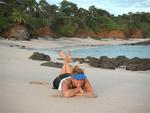 Here I am relaxing on Isla Del Rey. 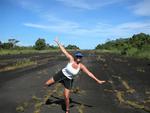 The old World War II landing strip now used illegally by the drug cartel. 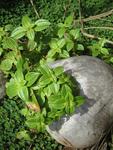 A palm tree in its infancy. 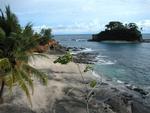 Punta Cocos on Isla Del Rey, Panama. 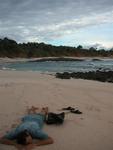 Greg resting after our long walk. The sand on this beach was composed entirely of crushed sea shells. 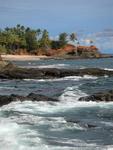 The blue waters, cream sands, red earth and green trees of Punta Cocos. 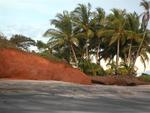 The brick red earth exposed by the tides which often rise and fall twenty feet a day. 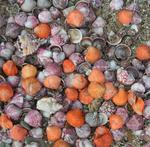 The orange and purple scallop shells of Isla Bayoneta. 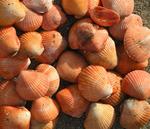 Orange shells as far as the eye can see. 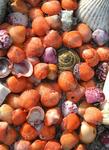 When I lifted the scallop shells, I could hear the sea!! Probably because I was a few feet from the shore! 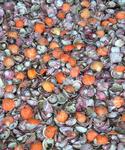 New occupation idea...selling sea shells by the sea shore? 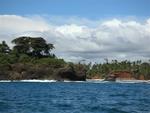 Punta Cocos. 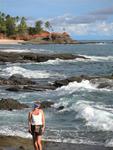 My favorite beach! | cherie writes: How the Las Perlas Islands Got Under My Skin
We went there again, reluctantly. To the “officina de grouchy old ladies” as Greg had dubbed it. The grandmas working there would have been cute if they were baking us cookies or knitting us a sweater. But they kept telling Greg and me to come back another day. They were too tired to type up the navigational permit we needed to sail Scirocco around the waters of Panama. Too tired? (We had been to their office three times already (on three separate days) and always caught them in the same crabby mood.)
Greg and I didn’t want to explore the uninhabited islands off the Pacific Coast of Panama without this document. The guidebook insisted that we need this permit; the grandmas insisted we didn’t.
“I think you’ll be okay without it,” they offered. I didn’t like the word “think.” It was a good thing we finally convinced them to take our $75 dollars and type the paperwork up for us because a week later, when we were in the middle of nowhere, not having seen a single boat or person for over a week, we were boarded by the Panamanian Coast Guard. The Coast Guard definitely “thinks” you need that form.
I was lying in Scirocco’s cockpit when Greg said: “I think you better put on some clothes.” I was wearing a bikini and basking in the warm sun.
“Why?” I asked. I’d never make it in the military; I always have to know why.
“Someone is paying us a visit.” Greg said. I thought about his choice of word “paying.” If someone was “paying” us a visit, it was definitely us who were going to be doling out the cash.
“Who?” I asked confused. Then I followed Greg’s finger and saw that he was pointing to a Coast Guard boat heading directly for us. My eyes fixated on something else aboard the vessel that was on a collision course with us--the machine guns. There were nine men Coast Guard ship, each adorned with an assortment of automatic weapons. I was used to seeing black sand beaches scattered with orange shells, now I was focusing on black exposure-suits with orange life-jackets. Halloween costumes in the tropics?
We were under sail gliding along at about 6.5 knots. Greg and I just stared in blank amazement as they pulled up alongside us, matched our speed, and jumped aboard Scirocco.
If it was a movie, Arnold Swartzeneger would have stared as the Panamanian with the biggest gun. With a thick accent he would have said: “Prepare to be boarded.”
It was an interesting scene, two Americans on a 41-foot sailboat with a bunch of men with machine guns on the bow.
“Habla Espanol?” the wannabe Arnold asked.
“Si, yo hablo Espanol.” I announced proudly. I’ve become practically fluent. Then he spoke to me in English for the rest of the transaction. He wanted to practice. Then why did he ask if I spoke Spanish? Was he taking a poll? I obliged and spoke English. I wanted to practice not getting shot.
They seemed pretty friendly for scary guys with big guns. They carefully examined all of our paperwork, and amazingly enough, all of our forms, stamps and receipts were in order. (We are usually without whatever document is most important, or missing some crucial stamp that can only be obtained with a bribe in some thatched-hut located twelve hours away.) I wanted to lighten the mood and offer him a beer, but I thought better of it. Guns and booze don’t mix.
The gun men said they were going to search our boat, but they must have anticipated that the only kilo of powder we had on board was laundry detergent. We escaped un-searched and unscathed. The entire time the Coast Guard was rifling through our paperwork we were under sail. They left with the same heroic hurdle over the ocean that they boarded with. Their vessel pulled along side of us, and they gracefully leapt to the bow of their own ship. So that’s what Panama does with its ex-gymnasts, they become Coast Guards.
***
We explored the islands of Las Perlas for a week, slowly meandering from perfect beach to perfect beach. When the storm-of-the-day began to get violent, we would simply anchor and wait it out. We found ourselves off a little cove in Isla Bayoneta during one such weather tantrum. Greg turned on the radar to see how long it would take the storm to pass over us. The weather system was eight miles long and moving fast. It seemed like we’d be in for no more than an hour of Panamanian rain (which is the same volume of rain southern California gets in a year.) It’s strange to wear fowl weather gear over a bathing suit, but that odd coupling has been our daily attire in Panama. Some old guy from Panama must have been the one to coin the saying: “If you don’t like the weather, just wait fifteen minutes.”
As the wall of water separated into more manageable drops, I was confused by what I saw in front of us. It was a beach, of that, I was certain. But its sand was orange and purple. Could it be fallen fruit scattered on the shore? Plumbs and oranges on the beach? I couldn’t tell.
It wasn’t until we paddled to shore and I was standing over them that I fully understood what I was looking at. Shells. Magnificently brilliant orange and purple scallop shells. And there were layers and layers of them.
And what goes perfect with a sunset and an untrodden beach lined with color- splashed shells? A bonfire! Greg and I had packed a cooler full of hot-dogs, sodas, and chips. Now all we needed was a blazing fire after the sun went down.
Greg and I scavenged Isla Bayoneta for fire-wood. Greg’s task was daunting: to build a fire with some soggy matches and wet wood. My task was equally daunting: to pretend to be cheerful while I waited three hours in the soaked sand. This was the ultimate test of Greg’s Eagle Scout status: to create a flame of warmth after a tropical torrential downpour.
The sand and I snuggled in front of a bunch of smoldering sticks for two hours while Greg rubbed twigs together. That night, those branches were the only ones getting any heavy breathing.
As the cool evening breeze became a cold wind, I still had faith in possibility of a flame. “Maybe we could put the hot dogs over the smoldering bark to give them that smokey flavor?” I suggested.
“No!” Greg insisted. “I am going to make a fire.” He seemed to be getting a little kooky about this fire-making thing, so I just sat smiling--surrounded by lots of sand and even more smoke. Little did I know, as I patiently waited, that an army of sand flees were burrowing into my skin.
Greg ran back into the dense jungle trying to find a few dry branches of wood. I heard him yell through the trees “You’ll never believe what I’ve found!”
He came running down the beach, all teeth and a huge grin! “This is the same as lighter fluid!” He was holding clumps of moss in each hand. By his excitement, you would have thought he found a drum of gasoline and a crate of dynamite.
“Would you go scrape up some more moss, while I get us a real fire going?” Greg asked.
“You say the sweetest things,” I whispered in his ear.
So there we were: Cherie-the-moss-gatherer and Greg-the-fire-builder. At this point, doing a fire-dance didn’t seem like such a bad idea. But in the end, I had to hand it to Greg. He eventually built a fire the Devil himself would have been proud of.
Greg grabbed a stick, stabbed a hot dog and said: “I’m going to make you dinner.” The cave man in him was really coming out. Greg put the dog in the middle of the flame (why do guys always do that?) caught the dog on fire and then snubbed it out by smothering the flames on a dank log. Then with genuine pride he offered me the burnt moss-dog-on-a-stick. “How romantic is this? I take you on my yacht to a remote island and make you dinner.”
“It is very romantic. But I think you should eat the first one. After all, you worked so hard!” I said.
Greg plopped the meat in a bun, squished some condiments on top and took a bite.
“How does it taste?” I asked.
“Like burned plastic,” Greg said with a scrunched up face.
“Maybe you should try not to catch it on fire next time. There is a reason why even the worst restaurants don’t serve hot-dog flambé.”
Then Greg pulled a wad of half-chewed cellophane from his mouth. Each of the hot dogs had been individually wrapped in plastic. Each wiener had its own condom. And they say that Americans over-package their food!
“Well,” Greg said, “At least it’s not my cooking!”
Then we peeled the rest of the plastic sheaths off the dogs and had a meal any Homo Erectus would envy. On our paddle back to the Scirocco, I started to feel a little itchy. I thought it couldn’t get worse than an insect that sucked your blood and introduced possibly fatal viruses into your system like Malaria and Dengue Fever. But sand flees are worse. They really get under your skin (literally and figuratively.) Then after they’ve taken root beneath your flesh, they do the mamba for three days. Their fidgeting was my itch-fest. No amount of cream could sooth my need to scratch the skin off my bones.
The only thing that could keep my thoughts off my sand flee-infested legs was the U-boat. There was supposedly rusty Japanese WWII submarine beached off the island of San Telmo. We circled the entire island with the binoculars imbedded in our eye sockets. We looked and looked but couldn’t find it.
After a hearty search, we put the binoculars down, gave up and sailed away. It must have been a rumor, I thought. Or a storm may have taken it back out to sea, Greg suggested. Of course, a week later, a local fisherman informed us that the reason we didn’t find the sub was because the submarine was submerged. Duh. The wreck was there! It was resting less than six feet of water, just waiting to be explored with our masks and snorkels. And we missed it!!! You don’t find shallow submarine-wrecks everyday. We were so close, and yet so stupid.
This is when another boat came along side us, except the occupant didn’t have an automatic weapon. He had a dug-out canoe, a hand-carved paddle and a boat full of lobsters and coconuts to barter. We traded him some chocolate candies for some coconuts. I imagined him going back to his tribe and saying: “Good trade.”
Then we sailed off to the most perfect beach I have ever seen—Punta Cocos on Isla Del Rey. It started with white sand, which led to red earth, and the view was topped off with vibrant green grass and swaying palm trees. Not to mention my favorite part—no people. Greg and I walked the beach and explored the island all day until we saw something in the distance. It was two men walking towards us. But where did they come from? There were no villages there and no other boats. As the men came closer, I saw their guns. Now I was wishing for some other tourists.
They fired out Spanish faster than I could understand. So much for me being fluent. I asked them to speak slower and then I figured out what they were saying. The airstrip on this island was used by the drug cartel. It was dangerous to be here after dark and we should return to our boat quickly. They were part of the Panamanian government patrolling the airstrip for our safety. So we got a very friendly machine-gun escort back to Scirocco.
The Las Perlas Islands hold some of the world most beautiful beaches, colorful shells, and incredible scenery. If you are not afraid of big guns, I highly recommend them.
Click on each picture to see it full size.
read comments (0) |
write comment| views: 18068
| rated: 0.0
printer-friendly version
|
| |
|
